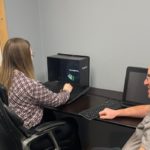
Dr. Shidlofsky with a staff member, who is seeing what it’s like to be tested using Cognivue Thrive®. He says the technology allows him to provide more comprehensive care while building profitability.
Sponsored Content
By Charles Shidlofsky, OD, FCOVD
Oct. 12, 2022
The connection between cognitive function and vision has received heightened attention recently due to a study that showed the impact failing vision has on the brain. In my practice, we have long understood the connection between vision and the brain. However, this new research shows that, beyond providing care for patients who have suffered traumatic brain injuries (TBI), and those completing a program of sports vision therapy, understanding the connection between vision and cognitive function can improve care for all patients.
In my practice, we are using a new technology, Cognivue Thrive®, that allows us to measure cognition through vision. Cognivue Thrive utilizes a patented technology, Adaptive Psychophysics, to accurately measure people’s ability to receive, process and respond to their visual world. Here is how we are optimizing this device in our office.
A Technology with a Small Footprint, but Wide Application in Elevating Care
We added Cognivue Thrive to our practice in 2020. We ordered it just before the start of the pandemic lockdown. Once we got back in the office in May 2020, we started to utilize the technology on a daily basis. I utilized it to screen FC Dallas (MLS soccer), and for my adult TBI and acquired brain injury (ABI) patients.
I simply wanted to see what my patients’ current neuro-cognitive status was prior to beginning neuro-vision rehabilitation or sports vision training, and then re-measure upon completion. I was heartened to see that, in most cases, there seemed to be a significant impact on neuro-cognitive skills after completing therapy.
The Cognivue Thrive unit, which is the size of a laptop and does a five-minute screening, is impressive in how it allows us to improve care for patients and build our practice. We do 25-30 tests per month using this device. Most recently, we did a study on Visual Snow Syndrome, and utilized the Cognivue Thrive test as part of our testing protocol (an IRB study).
We now use Cognivue Thrive for most of our patients over the age of 45 to assess how well their vision and brain work together to achieve cognitive function. Cognivue Thrive can enable a more thorough evaluation.
Deliver a High Level of Care While Building Profitability
With such a huge population of patients benefiting from assessment via our Cognivue technology, we were able to create both a care and profitability booster.
We charge patients a minimal fee for the Cognivue Thrive test (similar to what people charge for fundus photography). Based on doing 25-30 per month, that easily covers the cost of the device, and makes the Cognivue Thrive test profitable.
We see a large population of TBI/ABI patients. Many of them are part of an aging population, in addition to experiencing a challenging neurological condition. For all of my aging adult patients, I discuss several elements that affect cognition such as sleep, exercise, nutrition and memory. Based on their responses to my questions, if I perceive potential signs or symptoms of cognitive issues, I strongly recommend an evaluation using Cognivue Thrive.
Give Patients Information They Need to Improve Their Lives
When patients understand how their vision is tied to their cognitive function, and you are able to provide, or direct the patient, to needed additional care, their lives are improved. Patients often tell me they enjoy the process of getting evaluated with Cognivue Thrive–some even have said they find it fun!
Patients love technology and they love information. This is an opportunity to have an impact on both elements. In fact, I had a physician’s assistant for a family practice visit us recently. She heard about our Cognivue technology, and wanted us to run the test on her, so she could learn about it, and refer patients to us to also be tested with Cognivue Thrive.
When you have the kind of technology that allows you to provide an unusually high level of care, the word gets out, and patients visit for both routine eyecare and to benefit from an evaluation that could help them change their lives for the better.
 Charles Shidlofsky OD, FCOVD, is the Center Director and owner of Neuro-Vision Associates of North Texas in Plano, Texas. To contact him: dr-s@dr-s.net
Charles Shidlofsky OD, FCOVD, is the Center Director and owner of Neuro-Vision Associates of North Texas in Plano, Texas. To contact him: dr-s@dr-s.net

























